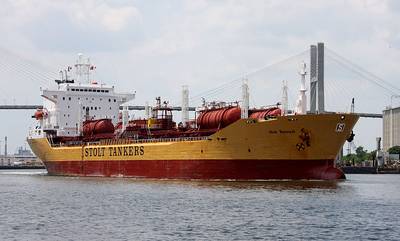Norwegian chemical tanker owner Stolt-Nielsen on Thursday reported a second-quarter net profit attributable to shareholders of $58.6 million, with revenue of $689.1 million. This is an increased compared with a net profit of $52.3 million, with revenue of $606.2 million, in the first quarter.
Niels G. Stolt-Nielsen, Chief Executive Officer of Stolt-Nielsen Limited, said the second quarter net profit was the company’s highest since 2007.
“The second quarter continued where the first quarter ended with growing demand and a shrinking orderbook for new ships, with the positive momentum continuing to build in the chemical tanker market. Our tanker trading team is standing firm on contract renewals and spot fixtures to capitalise on the tightening market, and we are moving in the right direction.”
Still a Long way to go
“However, considering the historically low freight levels and weak returns that the chemical tanker industry has seen for many years now, we still have a long way to go until our returns through the cycle are sufficient to attract long-term capital for further investments in newbuildings.
“At Stolt Tank Containers the team has been highly successful in securing space on ships in a very tight market, ensuring our customers’ products can reach their customers, and in the process have been able to produce another quarter with record results. At Stolthaven Terminals the increase in utilisation has allowed us to drive up margins in a tightening storage market. And at Stolt Sea Farm, maintaining prices in a challenging market has delivered a continuation of the good underlying operating results.”
Rising Freight Rates for Stolt Tankers
He said he expected the positive momentum to carry through the rest of the year.
“Stolt Tankers should continue to see rising freight rates that will outpace the rise in fuel costs. STC may see demand fall off slightly due to high transportation costs driven by supply chain bottlenecks, but should still enjoy good margins throughout this year. At Stolthaven Terminals, high utilisation will have a positive impact on margins for the rest of the year. And at Stolt Sea Farm the summer months are typically accompanied by higher demand for quality seafood,” Niels G. Stolt-Nielsen said.
Effect of War in Ukraine
“Although we are starting to enjoy improving returns on our investments, we cannot ignore the many external challenges that lie ahead. The war in Ukraine is increasingly impacting energy supplies, particularly in Europe. Excess liquidity in the private sector following many years of quantitative easing, together with post-pandemic demand, has driven up inflation, which is now being amplified by rapidly rising oil and gas prices.
“To curb inflation central banks are raising interest rates, which, if taken too far, will inevitably lead to a global recession. We are monitoring the potential impact these factors could have on our businesses. We remain cautious when making new investments, ensuring that the return hurdles account for higher inflation and funding costs in the future, and we are maintaining our focus on debt reduction to strengthen the balance sheet and continue to favour fixed rate loans to protect our cash flow against rising interest rates.”


